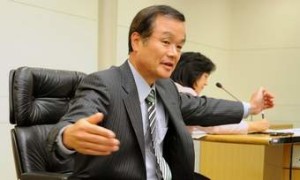Honda president says he has ‘no regrets’ about Formula One pullout
Honda president and CEO Takanobu Ito told a group of reporters on Thursday night at the company’s Tokyo headquarters that the decision to quit Formula One racing last year was absolutely necessary for the company’s survival. And even after watching Honda’s former team, now named Brawn GP, win both the drivers’ and constructors’ championships this season, Ito has no misgivings about pulling out of the sport.
“[I have] no regrets,” he said through an interpreter. “After our withdrawal, we’ve seen our team doing extremely well. The reason why I say this is because of all the efforts we put into the team prior to our withdrawal that led to this result,” Ito said.
The decision to quit F1 was made by Ito’s predecessor, Takeo Fakui. Ito took the helm of Honda in June.
“Just a year ago, Mr. Fakui made the decision to withdraw from Formula One racing and I think it was the correct decision,” Ito continued. “We do love Formula One racing, but even more than that, we had to think about our company; following the [worldwide recession] our management environment had truly deteriorated, also due to the need to comply with environmental needs, [which meant] we had to develop new technologies. So this came first.
“I can surely say the few hundreds of people that were working on Formula One and the tens of billions of yen used for Formula One, this has been converted to the development of environmental technologies.”
Ito said the decision to get out of the money-swallowing series was not all that difficult for Honda.
“Usually when we decide to withdraw our team from Formula One racing, there are fights and anguishes … fortunately the team has succeeded. It has produced very good results, so people seem to be very happy which is quite unusual.
“Honda is very proud of the fact that we were able to make such a smooth withdrawal based on a very well-thought out plan…. I think we did very well with the withdrawal and after the withdrawal, we managed very quickly to inject all our resources into environmental technology development. [We are] very proud the management was so speedy in making this change,” Ito said.
Among auto manufacturers in racing, Honda had gained a reputation for taking bright, young engineers and assigning them to racing teams, where they have to make quick, correct decisions. Because of the demands of racing, this training ground for engineers hones their analytical and decision-making skills, and when they leave racing and return to making road cars, those skills are then shared throughout the company.
But Ito said the world has shifted, and with the demands placed on car companies today, engineers can find all the challenges they need making road cars.
“I cannot deny the fact that racing is truly challenging and trying. Yet in looking at the situation we are faced with right now, we are truly pressed for time to develop these technologies even more than we were pressed for time during our Formula One racing. And the output expectation is bigger. I think the engineers do have a training ground here by working on these technologies we are working on now.”
Lost marketing
Honda, the previous owner of the Brawn GP Formula 1 team which clinched both the drivers’ and constructors’ world championships last weekend, missed out on at least $255 million of brand exposure during the course of the season, according to Margaux Matrix. The U.K.-based media analysis agency evaluated TV broadcasts and advertising rates in 18 countries during the first 15 races of the season.
According to its results, the two Brawn GP race cars benefited from 8.5 hours of international coverage in those races, more than three times Honda’s number in 2008. When Honda quit Grand Prix racing at the end of last season, it said it would save at least $221 million a year in operating costs.
Sourced via autoweek.com







